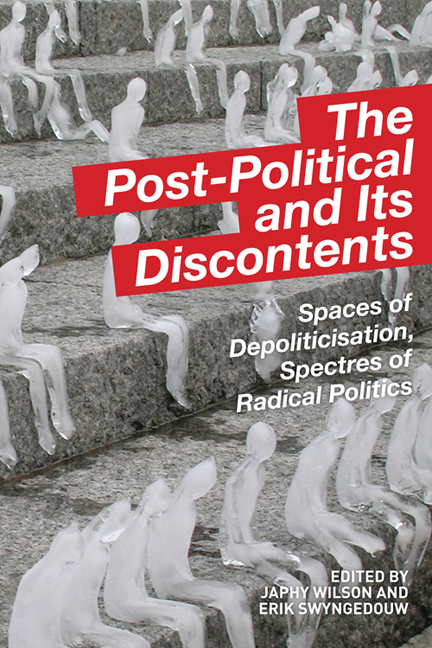Book contents
- Frontmatter
- Contents
- List of Contributors
- Seeds of Dystopia: Post-Politics and the Return of the Political
- Part I Spaces of Depoliticisation
- Part II Spectres of Radical Politics
- 8 Insurgent Architects, Radical Cities and the Promise of the Political
- 9 The Limits of Post-Politics: Rethinking Radical Social Enterprise
- 10 Neither Cosmopolitanism nor Multipolarity: The Political Beyond Global Governmentality
- 11 Against a Speculative Leftism
- 12 Spatialising Politics: Antagonistic Imaginaries of Indignant Squares
- 13 After Post-Politics: Occupation and the Return of Communism
- 14 The Enigma of Revolt: Militant Politics in a ‘Post- Political’ Age
- There Is No Alternative
- Index
11 - Against a Speculative Leftism
from Part II - Spectres of Radical Politics
Published online by Cambridge University Press: 05 August 2016
- Frontmatter
- Contents
- List of Contributors
- Seeds of Dystopia: Post-Politics and the Return of the Political
- Part I Spaces of Depoliticisation
- Part II Spectres of Radical Politics
- 8 Insurgent Architects, Radical Cities and the Promise of the Political
- 9 The Limits of Post-Politics: Rethinking Radical Social Enterprise
- 10 Neither Cosmopolitanism nor Multipolarity: The Political Beyond Global Governmentality
- 11 Against a Speculative Leftism
- 12 Spatialising Politics: Antagonistic Imaginaries of Indignant Squares
- 13 After Post-Politics: Occupation and the Return of Communism
- 14 The Enigma of Revolt: Militant Politics in a ‘Post- Political’ Age
- There Is No Alternative
- Index
Summary
One may term ‘Byzantinism’ or ‘scholasticism’ the regressive tendency to treat so-called theoretical questions as if they had a value in themselves, independently of any specific practice … It can further be deduced that every truth, even if it is universal, and even if it can be expressed by an abstract formula of a mathematical kind (for the sake of the theoreticians), owes its effectiveness to its being expressed in the language appropriate to specific concrete situations. If it cannot be expressed in such specific terms, it is a byzantine and scholastic abstraction, good only for phrasemongers to toy with. (Gramsci Q 9, § 63; 1971: 200–1)
Periods of revolutionary insurrection prompt periods of reflection on the nature of politics. What may only be tentative signs of the abilities of subaltern groups to reshape social relations provoke treatises on the successes and the frustrations of such interventions, treatises which often turn on a reconceptualisation of the political. In the wake of Occupy's dramatic emergence and equally sudden disappearance, the attempt to delineate the bounds of the truly political event has yet again acquired a new urgency. In this chapter, I argue that how we engage with actually existing movements such as Occupy – and how we understand ‘politics’ in relation to them – matters enormously. It matters not only for the nature of our work as scholars but also for the power relations shaping knowledge production. The form of our engagement with social movements, moreover, will be shaped by where we see the conditions of possibility for future change. My focus in this chapter is largely confined to the political conceptions of Antonio Gramsci – which were developed in the wake of the Factory Councils and the reversal of a revolutionary moment as Italy descended into fascism – and their posthumous reception in post-Althusserian scholarship, which has influenced more recent readings of the political and post-political (Laclau and Mouffe 1985; Butler, Laclau and Žižek 2000). Moving between post-Althusserian Marxist scholarship and Gramscian readings of the political, I argue for a conception of the political based on a philosophy of praxis, and criticise the privileging of conceptual abstraction over contextualised readings of historically and geographically specific practices.
- Type
- Chapter
- Information
- The Post-Political and Its DiscontentsSpaces of Depoliticisation, Spectres of Radical Politics, pp. 229 - 243Publisher: Edinburgh University PressPrint publication year: 2014



